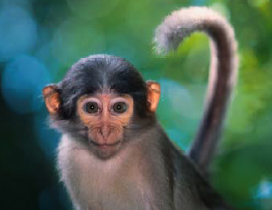Primate conservation may enhance food availability to human
Primate conservation may enhance food availability to humans
mongabay.com
September 15, 2008
Primate conservation may have the unintended benefit of enhancing food availability to humans, reports a study led by African scientists.
The research, conducted in the Taï region of Côte-d’Ivoire, found that seven species of monkeys used about 75 species of plants as a source of fruit, of which 25 were also used by local human inhabitants for various purposes. Because monkeys are key seed dispersal agents, the results suggest that primate conservation may sustain the persistence of plant resources important for human livelihoods.
"The cost of losing monkeys extends beyond the loss of the animals themselves," write the authors. "Indeed, the local extinction of frugivorous primates is predicted to have deleterious consequences for forest regeneration and/or tree species community composition."
 Cercocebus atys, a money found in the Taï region of Côte-d’Ivoir. Photo by F. Möllers. |
The authors, led by Inza Koné from the University of Cocody in Abidjan and the Taï Monkey Project, note that monkeys in the region are already experiencing "extreme hunting pressure" as a source of protein and as crop pests. Primates are also threatened by habitat loss caused by the conversion of forest for agriculture.
Koné and colleagues suggest measures to conserve monkeys will offer multiple benefits to the primates themselves as well as local communities.
"Results of this study suggest that maintaining populations of monkeys is important not only for forest regeneration, but also for human habitat use," they continue. "The conservation of primate species is a critically important goal in itself; by working to ensure their protection in forest fragments, we protect indirectly the seed dispersal of important human resources in these fragments as well."
"Protection of monkeys and seed dispersal systems outside protected areas is particularly relevant in this context, since it is in these areas… that primates are most at risk, and also where people are allowed to exploit forest plant resources."
The study is published in the open-access journal Tropical Conservation Science. Authors also included Joanna E. Lambert from the University of Wisconsin-Madison; Johannes Refisch from the University of Bayreuth, Germany and the Taï Monkey Project; and Adama Bakayoko from the University of Cocody, Abidjan, and the Centre Suisse de Recherches Scientifiques en Côte-d’Ivoire.
Inza Koné, Joanna E. Lambert, Johannes Refisch and Adama Bakayoko. Primate seed dispersal and its potential role in maintaining useful tree species in the Taï region, Côte-d'Ivoire: implications for the conservation of forest fragments. Tropical Conservation Science Vol. 1(3):293-306, September 2008